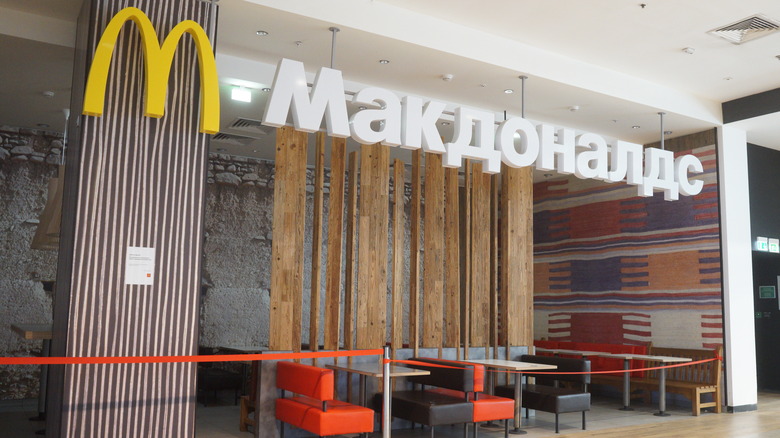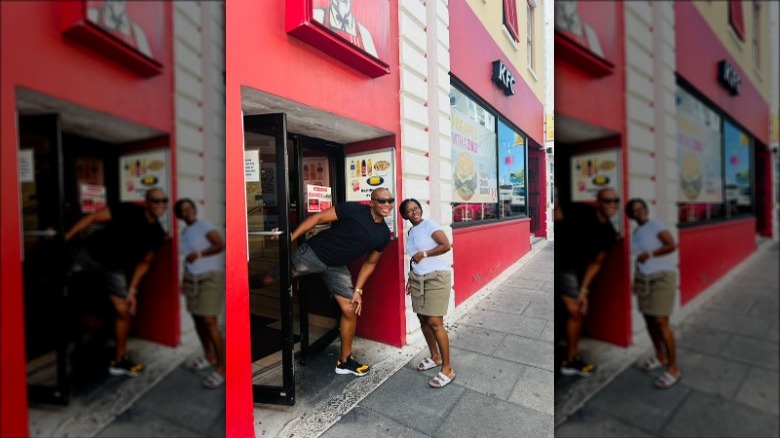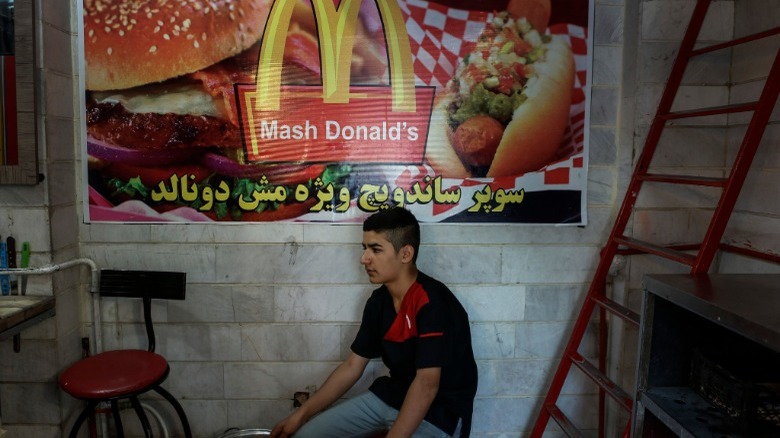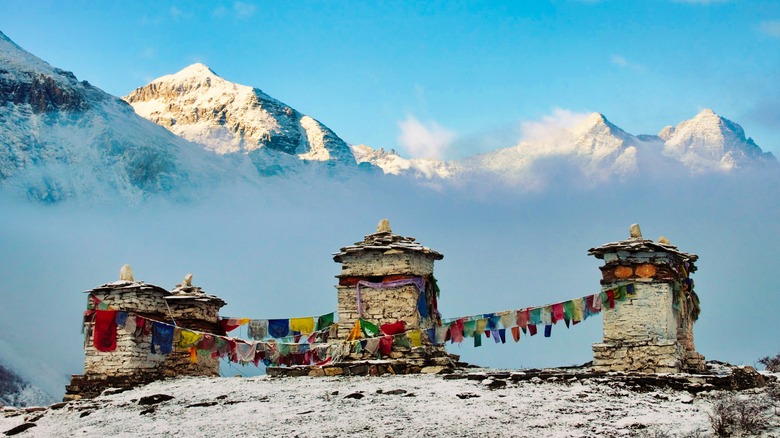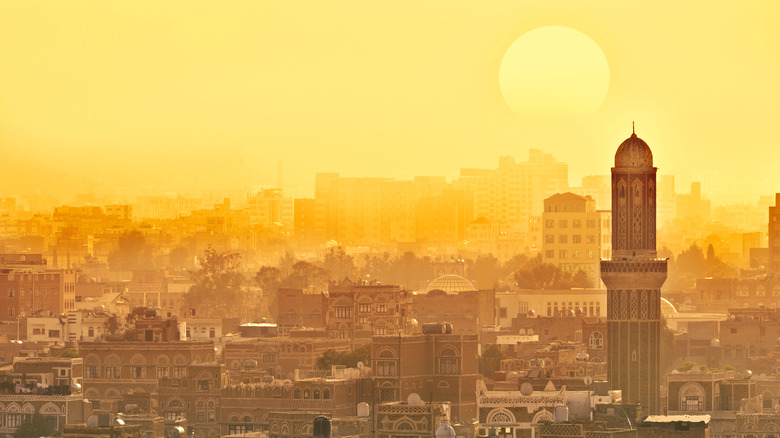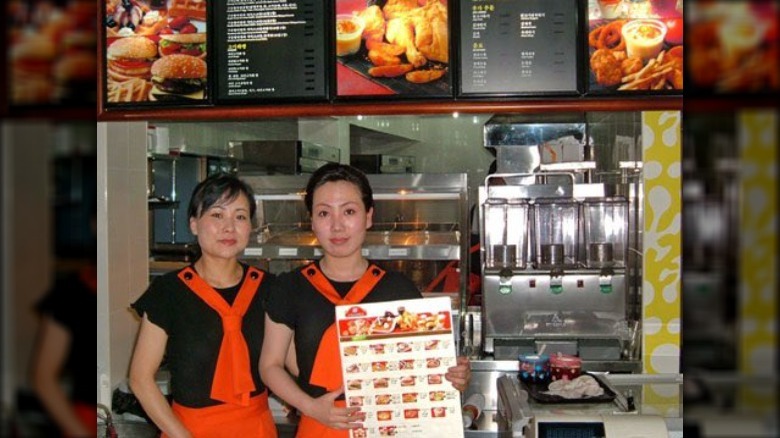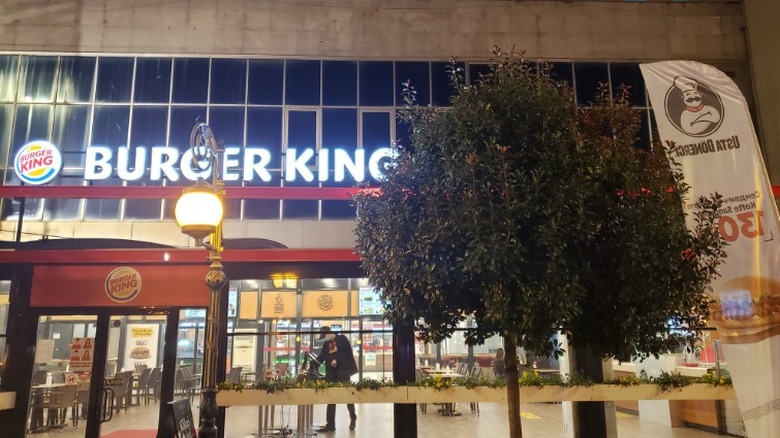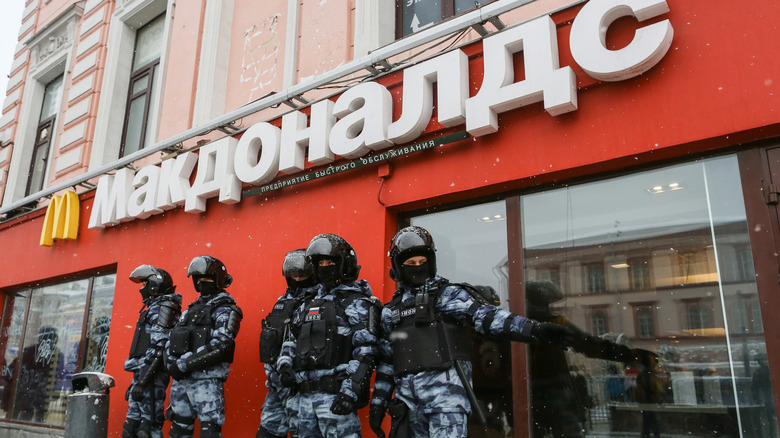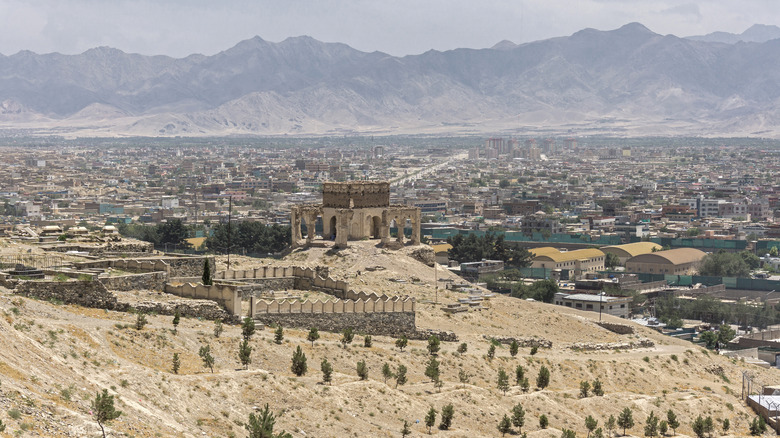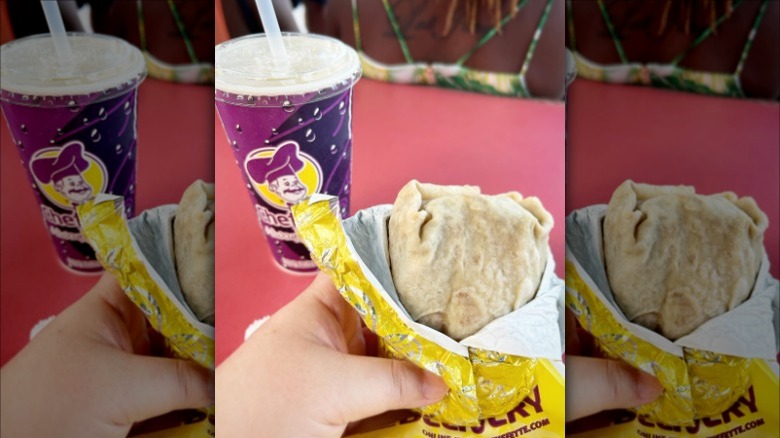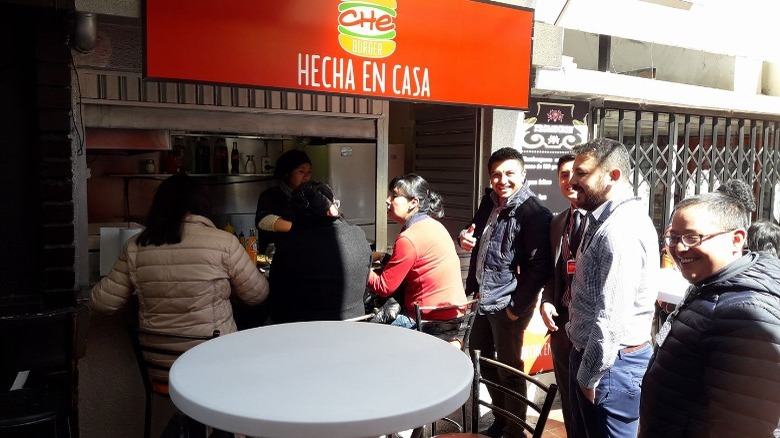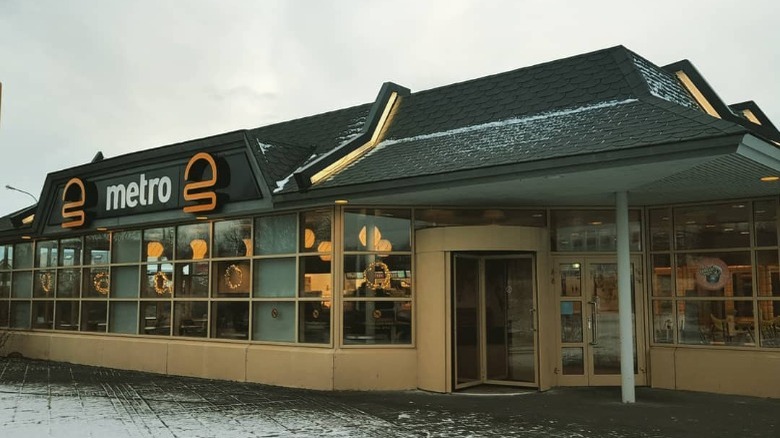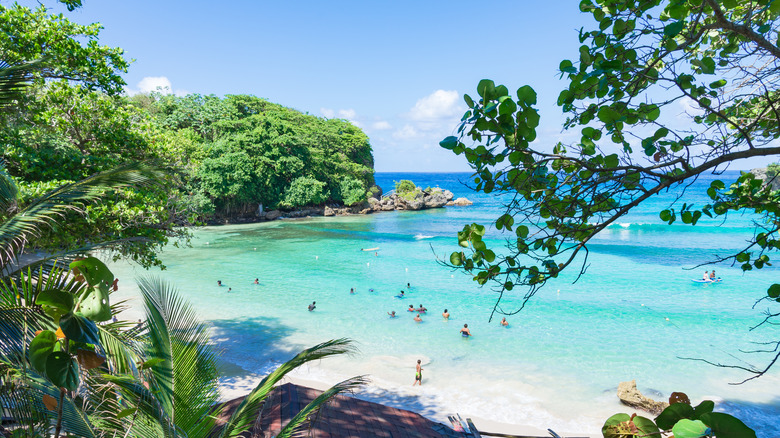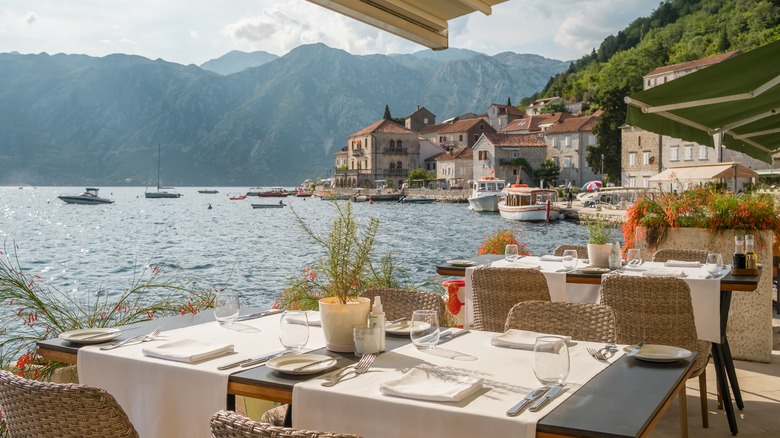13 Countries You Won't Find A McDonald's
McDonald's is the largest fast food chain in the world, but despite having 38,000 locations globally, you won't find it in every country. While there are 193 to 237 countries in the world (depending on your definition of "country"), McDonald's is surprisingly only in a little over 100 of them. So, that leaves more than 100 countries you can visit and not worry that your friends will drag you to a McDonald's rather than eat the local cuisine.
The relationship status for the 13 countries on our list is complicated. There's not any one reason why McDonald's was banned, pulled out, or failed in these countries. However, they mainly include economic, political, cultural, and health reasons. Even the bans aren't necessarily for the reasons you think. There are plenty of places where McDonald's just doesn't work because it's not compatible with the way people there like to eat. Sometimes, though, the timing just wasn't right, so there's still a chance you'll see the chain return in the future.
Bermuda: McDonald's is banned
Bermuda depends on tourism, so adding foreign fast-food restaurants all over the islands would take away from its unique identity tourists come there to experience. So, not only is McDonald's banned in Bermuda, but the Prohibited Restaurants Act of 1977 banned all foreign fast-food chains from opening there. A Kentucky Fried Chicken that opened in Bermuda before 1977 still exists, but it's the only foreign chain remaining since it was grandfathered in.
Bermuda once had a very popular McDonald's at the U.S. Naval base in St. George's Parish. Despite the ban, a McDonald's restaurant was able to open there in 1985 for military members and their families because it was U.S.-owned. The base opened the restaurant up for civilians to visit on certain days. Fans ate their last Big Mac in Bermuda in September of 1995 when the base closed down for good. Ultimately, the restaurant wasn't allowed to stay open on its own because of the no-foreign-fast-food-chain rule.
Iran: McDonald's is banned
McDonald's is no stranger to Iran, having had locations in Iran before the 1979 revolution. However, one that bravely opened in 1994 only lasted a couple of days before protesters burned it to the ground. Currently, McDonald's and any other U.S. cultural restaurant influence is forbidden in Iran, with the country's supreme leader actively blocking anything that could erode Iranian culture. In 2015, Ayatolla Ali Khamenei went as far as to tweet, "We waste no efforts to shut ways of infiltration into the country. We'll allow neither economic, nor political, nor cultural intrusion of US." The reason he gives in another tweet is that he thinks the U.S. wants "to disintegrate Iraq." This fear is why you can't find a McDonald's in Iran.
However, you can find a restaurant in Tehran, Iran, called Mash Donald's that has blatantly stolen the Golden Arches logo. The owner of Mash Donald's told the New York Times, "We are trying to get as close as we can get to the McDonald's experience," so the colors and themes you'll see in the restaurant are the same as what it's trying to imitate. You'll also find other knock-off restaurants like Kabooki Fried Chicken, ZFC, and Pizza Hat around the country, but you won't find the real thing.
Bhutan: McDonald's isn't welcome
Bhutan is known as the "Land of True Happiness," but it is also isolated in many ways. The country has been wary of international exchange eroding its culture, so it didn't open its borders to foreigners until 1975. The country softened its stance somewhat by finally allowing its citizens to watch television and use the internet in 1999. While you can now find cuisine from around the world in Bhutan, you won't find a McDonald's. Some people seem to think it's because Bhutan has a lot of vegetarians. However, only 2% of the population are vegetarians. Meanwhile, in India, where 39% are vegetarian, there is a McDonald's.
Since it's a landlocked country, Bhutan has no international seaports and mainly trades with India and Bangladesh, which would make getting supplies into the country tricky. But Bhutan has also enacted extremely harsh trade restrictions, and the country engages cautiously when it comes to allowing foreign companies to develop within its borders because of political, green, and even social reasons. Bhutan also has specific goals to avoid the "concentration of wealth in the hands of a few and exploitation by foreign companies" and maintain its culture, religion, and traditional way of life. So, it's no wonder that a country that holds its unique identity as sacred isn't too keen on importing Ronald McDonald and Big Macs.
Yemen: McDonald's isn't welcome
Yemen doesn't have a history of being open to U.S. businesses since Islamist militants have a habit of taking extreme actions against foreign groups they feel don't represent their values. U.S. companies like McDonald's have been leery of setting up shop in Yemen. But can you blame them? The U.S. embassy closed down in Yemen in 2015 as officials continued to be a target of assassinations, violent protests, and kidnappings. The U.S. Department of State advises against traveling to Yemen since any U.S. or Western person or company could potentially be the target of violent protests as a representative of the U.S. KFC is in more countries than McDonald's, but you won't find a KFC in Yemen either.
Yemen gets 90% of its food from other countries, and as a violent war rages on there, 75% of the population needs humanitarian help procuring food. So, a luxury like McDonald's just doesn't fit. The infrastructure couldn't support a McDonald's either. Clean water and dependable electricity continue to be an issue. So, even if the citizens were welcoming of U.S. restaurant chains, it wouldn't be feasible.
North Korea: McDonald's isn't interested
Some people think North Korea doesn't allow foreign companies to operate there, but the country actually extends business invitations to anyone outside the country. However, few companies take North Korea up on this invitation once they realize the country lacks the infrastructure needed to operate there, such as relevant employment laws, commercial banks, and insurance. Plus, utilities, telecommunications, and the supply chain aren't dependable.
Former supreme leader of North Korea, Kim Jong-Il was so obsessed with McDonald's hamburgers that when his Japanese chef couldn't reproduce the chain's burgers and fries, the chef was commanded to fly to Beijing, China, and bring back a Big Mac. North Korea has continued to request the chain to enter the country, but McDonald's (like many other companies) has refused. Even with some sanctions against the country being lifted, it's just not a place that fast food companies want to operate for both political and practical reasons. Currently, if you want fast food hamburgers similar to the Golden Arches in North Korea, you have to visit Samtaesong (Three Big Stars), which opened in 2009.
North Macedonia: McDonald's pulled out
McDonald's lasted in North Macedonia for 16 years, first arriving in 1997. We're not sure why McDonald's pulled out of Macedonia, but as of 2013, you could no longer find one there. The Macedonian company that had an agreement to open up franchises there lost its license. As a result, the five locations in the country closed.
McDonald's European communications director, Agnes Vadnai, told SeeNews, "After the termination of the agreement, SJ Company no longer has the rights to operate restaurants under the McDonald's brand." So, it doesn't seem like McDonald's was breaking up with Macedonia as much as it was breaking up with the SJ Company. However, SJ Company wasn't forthcoming with journalists concerning information about the breakup. We do know that it wasn't related to failed state inspections. No new franchise operator has managed to open up a location in Macedonia so far. So, if you want an American-style burger in Macedonia, you're left with Burger King.
Russia: McDonald's pulled out
The first McDonald's opened in Russia in January of 1990, just a couple of months after the fall of communism and the promise of the USSR to move toward a more democratic form of government. McDonald's was wildly popular and dotted the Russian landscape for 32 years before the company finally decided to pull out in May of 2022. McDonald's said, "The humanitarian crisis caused by the war in Ukraine, and the precipitating unpredictable operating environment, have led McDonald's to conclude that continued ownership of the business in Russia is no longer tenable, nor is it consistent with McDonald's values."
McDonald's sold its over 800 abandoned restaurants to a Russian buyer, Alexander Govor. However, it didn't do so without removing all the golden arches and forbidding Govor from using anything that would signify that the restaurant was an actual McDonald's, such as its name or menus. Within a month, Govor opened a new chain called Vkusno i Tochka (Tasty and That's It). Vkusno i Tochka's logo is a fancy letter M that may represent a burger and two French fries, menu items you will find in the new restaurant if there aren't supply chain issues.
Afghanistan: McDonald's doesn't exist
You won't find a McDonald's in Afghanistan, but you may find knockoffs. An entrepreneur in Kabul previously opened a restaurant called McDonald's that looked like the famous chain on the outside but wasn't anything like the chain on the inside. It featured 1980s Afghani decor and served traditional Afghani food.
In a 2021 Tweet, someone used photos of the knockoff restaurant to try to convince the world that Afghanistan had a real McDonald's. According to the fictitious Tweet, there was a McDonald's open at the Kabul airport that would remain open until all the U.S. citizens and troops in the country evacuated. The tweet appeared to have come from an official source — an ABC Investigations reporter named Dylan Welch. The real Welch responded to the fake Tweet with his real Twitter account, saying, "Someone has created a fake tweet pretending it's from me about US Marines and a restaurant in Kabul called Mcdonald's. I didn't write it. Please ignore it and focus instead on the plight of the millions of people in #Afghanistan abandoned by the int'l community."
This isn't the first time people have been tricked into believing there's a McDonald's in Afghanistan. When American troops first landed in Kabul in the early 2000s, their translators would send them on wild goose chases to find non-existent McDonald's in downtown Kandahar. Now as then, there is no McDonald's in Afghanistan.
Barbados: McDonald's failed and is banned
McDonald's was a huge flop in Barbados because it didn't understand what people there liked to eat. In fact, it was such a failure that it only stayed open for six months in 1996. The people in Barbados like healthy, flavorful foods and aren't big fans of beef. Unfortunately, that's the opposite of what the chain has to offer, and the menu wasn't adjusted with more chicken, fish, or pork items — or less bland menu items to fit local tastes.
The locally-owned restaurant chain that people call the "McDonald's of Barbados" is Chefette — a fast food chain that Barbados-born Rihanna adores. Chefette appeals to the way people in Barbados like to eat. You can get hamburgers and fries, wings, pizza, curry-flavored rotis, and salads, along with various types of ice cream. Beyond fast food, the chain's BBQ Barn locations also serve items like chicken, dolphin (which is mahi-mahi, not Flipper), marlin, burger, pork ribs, pork chops, or steak platters with healthy sides. It even has a playground for kids. So far, you can't find a Chefette outside of Barbados, but the company is open to the idea.
When a new company tried to open a McDonald's in Barbados in 2000, the Barbados Cabinet denied the application for fear it could hurt local businesses. Some of the organizations that influenced this decision were the Barbados Workers Union and the World Trade Organization. Chefette was also opposed to rivalry from the popular chain.
Bolivia: McDonald's failed
McDonald's failure in Bolivia was a cultural, economic, and political one. When McDonald's entered Bolivia in 1997, the company had done its homework about what the people there might like. For example, it offered a spicy Bolivian salsa called "llajua" on its burgers. However, the company didn't understand how ultimately unappealing its food would be. Sure, there were long lines when the restaurant first arrived, but those eventually dwindled when the newness wore off.
Bolivian politicians blamed foreign companies that started coming into the country in the 1990s for its soaring poverty. The chain arrived in a country at a time when 63% of the population lived in poverty, with 38% of those living in extreme poverty. At the time, the average Bolivian only earned the equivalent of $83 per month. Eating a $4 to $5 McDonald's meal was a splurge when you could visit a local burger chain like Che Burger or visit one of La Paz's 60,000 street vendors and find a full traditional meal for only $2 to $3. By 2002, poverty had increased in the country, and none of the eight locations were very profitable, so they closed.
In 2012, President Evo Morales banned Coca-Cola in Bolivia. Then, in 2013, he stated to the U.N. that "the fast food of the West is doing a great deal of harm to humankind. The major multinational food companies seek to control the production of food and to dominate global markets by imposing their customs and foods" (per CNBC). Of course, one could argue that he isn't incorrect.
Iceland: McDonald's failed
The failure of McDonald's in Iceland had nothing to do with its popularity and everything to do with the economy and lack of locally-sourced ingredients. When Iceland got its first McDonald's in 1993, it was one of the country's first steps away from isolationism and toward becoming a part of the global community. When the first restaurant opened, the lines were neverending for days.
Unfortunately, the 2008 global financial crisis sealed the fate of McDonald's and other foreign chains. With the stock market, banks, and businesses collapsing, the Icelandic Krona lost half its buying power. Unfortunately, the chain was sourcing all its ingredients from Germany. Franchise owner Jon Gardar Ogmundsson said, "For a kilo of onion, imported from Germany, I'm paying the equivalent of a bottle of good whiskey" (per CNBC). Ogmundsson said that, when the chain decided to close its three remaining Icelandic locations in 2009, his restaurant was busier than ever before. Up to 15,000 people were dining at McDonald's daily, but the profits were lower than they'd ever been. To actually be profitable, all the prices would have needed to increase by 20%.
When McDonald's left, a locally-sourced burger chain called Metro opened up to fill the void, and it's thriving. The menu looks similar to its predecessor's, but it has branched out to vegan and keto burgers, along with Korean BBQ. As recently as 2017, McDonald's international franchising website talked of considerations for returning to Iceland. However, that hasn't happened yet.
Jamaica: McDonald's failed
McDonald's first entered Jamaica in 1995 but only lasted 10 years. McDonald's failure in Jamaica was largely cultural. From the rules surrounding franchise ownership, how it sourced its ingredients, and what was on the menu, the chain just wasn't a good fit for Jamaica.
Not only did a franchise owner need to invest $2 million in ownership, but they would need to spend nine months with no income during training with no other businesses and a 20-year contract. The idea of an entrepreneur being forbidden from investing in other businesses for 20 years simply didn't coincide with how Jamaicans do business. Once the chain found someone to buy into that idea, there were still other problems. For one thing, the burger size just wasn't cutting it for the locals, who didn't find the small burgers to be as filling as burgers from other chains like Burger King. The chain also didn't go far enough to introduce local flavors into the menu, but even worse, it failed to serve alcohol.
The final Jamaican McDonald's closed in October of 2005 when the local franchisee decided she wasn't interested in continuing her ownership. After the restaurants closed, the Caribbean division of the chain was still trying to find new franchise owners for Jamaica, and the company was saying they'd like to return to Jamaica. However, it has not happened yet.
Montenegro: McDonald's failed
When McDonald's came to Montenegro in 2003, it did so as a mobile food truck, parked in a popular part of Podgorica. The mobile McDonald's both appeared and disappeared in the same summer, wheeled off into oblivion.
There were plenty of rumors as to why McDonald's left Montenegro, including one that said the government kicked the chain out of the country for being too unhealthy. Some people even spread the idea that local restaurants had bribed the government to kick the chain out of the country to eliminate unwanted competition and lost revenue. However, the Public Relations Bureau of the Government of Montenegro refuted this idea by presenting the Daily Meal with a press release that said that "no company, not even McDonald's, is 'forbidden' to do business in Montenegro." Ultimately, the government says that it doesn't play favorites when it comes to foreign companies that want to do business in Montenegro. So, everyone is still left with questions about what happened to the chain there.
